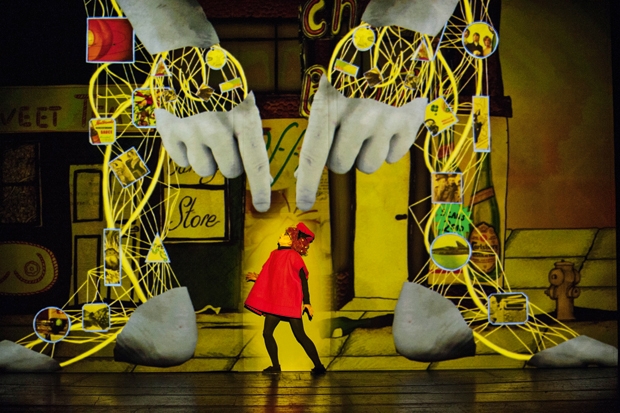The Young Vic produces shows that please many but rarely me. Its big hit of 2014, A Streetcar Named Desire, won virtually every prize going apart from the one it deserved: the year’s deadliest assault on a much-loved classic. The modernised setting offered us a tactless, shirty Blanche DuBois, played by Gillian Anderson as a stupefied boob-job victim searching for a rich jerk to bankrupt.
The Young Vic’s new year programme kicks off with Golem, adapted from Gustav Meyrink’s 1914 novel about a rabbi who fashions an automated slave from some discarded bits of candle wax. The show is created by a posse of euro-troubadours, with the confusing name 1927, who offer a superb blend of animation, satirical sets and puppet-like humans in comedy costumes. Bam! The visual impact is stunning. The designer has restricted himself to a narrow but vivid palette resembling a ketchup-splattered bumble bee. It’s all violent yellows, toasty browns, suave blacks and hooligan reds.
The optical exhilaration begins to abate as the story opens up. The tone is detached, superior, ironic and rather embittered. The lead character, a spineless moron named Bob, is stuck in a dead-beat back-office job, which goes kaput when a hyper-efficient robot replaces him. Bob and his cheerless chums mooch and slither through an urban landscape tagged with jokes that would struggle to make it into a sixth-form magazine. An osteopath is called Helen Back. An outlet named Lucy Froot sells fruit. A bridal mart carries the subheading ‘Brides: buy, sell, repair’. That pleasantry might have got a laugh in a suffragette sketch before the Great War but its edge has worn off a little in the intervening 101 years.
The characters are all desiccated, stooping whine-a-minute creations with no meaningful relationships and no dramatic goals other than to emphasise how detached they are from all that surrounds them. Pastiche figures such as these are impossible to sympathise with. To make Bob even harder to like he wheedles out his lines in a Leeds accent that deliberately mimics the preachy, fluting Victorian cadences of Alan Bennett. After 20 minutes, I started to flick through the programme notes, where Paul Barritt, co-founder of 1927, explains the socioeconomic background to his dramaticule. ‘Industrialised consumer-driven democracy doesn’t work,’ he announces with admirable finality. He surveys the wealth, plurality and security of the west and diagnoses a fever that he calls ‘the sickly sweet heroin of market-driven popular culture’. This, he goes on, has raised a ‘politically impotent generation’ who hanker for ‘a solution’ but who find the problem ‘impossible even to comprehend’. These are the ramblings of someone’s quaint old fascist grandad as he rises from his sickbed to denounce modern life before easing back on to the pillows and slipping his plastic dentures into his tooth-mug. Golem has elicited a weather bomb of praise online. Have a look. Exaltations on Twitter compete with myriad Facebook frenzies. I’m far too parochial and unsophisticated to embrace its pessimistic chic and I have to say that its status as a cult hit fills me with troubled wonder.
The Dragon, by the Soviet playwright Yevgeny Schwartz, invites comparison with Animal Farm. Both were finished in the penultimate year of the second world war and both used the conventions of the fairy tale to satirise tyranny. Schwartz’s play has an ingenious set-up. A dragon menaces a village whose rulers use the monster’s arbitrary predations to camouflage their despotic blunders. The dashing Lancelot arrives to slay the beast but he finds that the villagers’ souls have been corrupted and irredeemably enslaved by their oppressor.
The show promises serious themes in a frivolous setting but the Tangram Theatre Company approaches things in a spirit of chaotic narcissism. It wants the show performed in a casual ‘weekend house-party’ style that is gratingly artificial. There are no sets or lighting effects. The costumes are cherry-picked from the Oxfam reject pile. The cast won’t allow the audience to take their seats and enjoy the production in peace. On arrival, each play-goer is love-bombed by a desperate thesp grinning and chatting with the aggressive solicitude of a crack addict or a charity tout on the street.
The larky informality is distracting, then exhausting, and finally numbing. And its true purpose emerges at the end. A bride about to be married off to a violent groom comes out of character and scolds the audience for failing to rush forward and terminate the nuptials by force. That’s quite a dangerous precedent to set. Tangram will have no objection, presumably, when a bored play-goer interrupts its next show by walking on stage and announcing, ‘Curtain. The end. Go home.’ It may well be me.







Comments